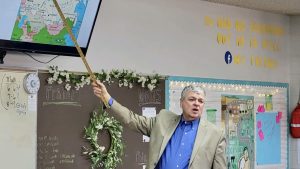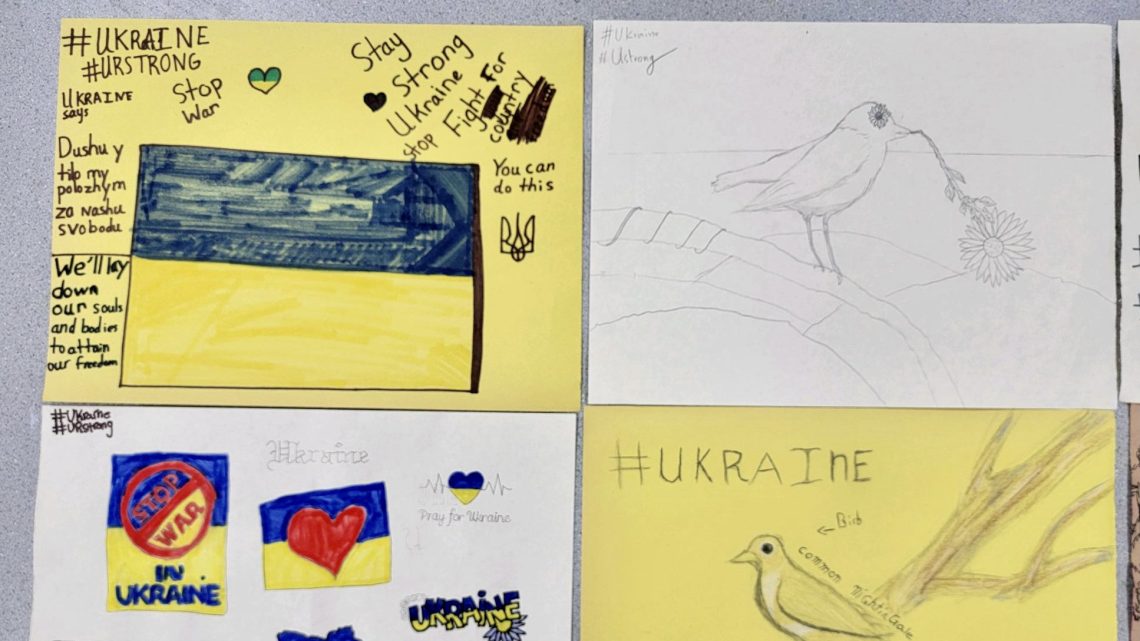“Don’t worry, it is on the other side of the world. It doesn’t affect you. Don’t think about it. Don’t worry about it.” Are these the best answers you can give your child when talking about the war in Ukraine? Absolutely not.
Our world has a violent war happening at this very moment. Russia is aggressively invading Ukraine. Sirens are screaming, women and children are fleeing, teens are wearing rifles instead of backpacks, buildings are standing silent. What is going to happen? Will this war grow larger?
This is the subject of every news source worldwide and is the topic of conversations everywhere. Certainly, your child is asking about this war. How does one talk to their child about such a dreadful global event?
The children want answers.
“From my experience, it’s best to summarize the war. Don’t go into detail; be very loose about it. That helped me because I know what’s happening, but I wasn’t told the gory details and about all the killing and violence,” said Gregory, seventh-grader at Brighton Adventist Academy.
Nathan, a fifth-grader at BAA, says he wants to know the facts. “I feel like adults should let the kids know what is going on and why it is going on. Let them know everything. This is what my parents do. That way, we can know what’s going on in the world.”
Children are very concerned and worried. “I am a little bit worried about the war. I wonder if it will ever end or if it will come here or not. But Mr. Morrison, my social studies teacher, helped me to learn more about it in class and it helped me know what is going on, so that I don’t have to wonder,” explained another student at BAA.
Christopher Morrison, grades 5-8 social studies teacher at BAA, explains how he handles the war in his class. “I ask them, ‘What do you know about this already? What questions do you have about this?’ I even ask them, ‘Who do you think the good guys are and who [do you think] the bad guys are?’ so that they have a chance to express their opinions. I will take opportunities to input balance into the conversations, and encourage my students to think about the subject critically.”
Morrison also encourages the students to reflect on what the life of a soldier must be like. “For example, I pose this scenario, ‘Did you know that a Russian soldier may not have the same mindset as their leader?’”
Morrison explains that at the middle school level and above, it is essential to urge students to evaluate and analyze information, to discuss point of view, and how to identify propaganda.
“By observation of our discussions about this war, it is apparent that each student gleans a great amount of information outside the classroom about this war. Historically, this is the most public war that has taken place because of social media. My students only need to click, and a large collection of first-hand account videos is at their fingertips. This can create questions for kids, so it is important for adults to address it,” Morrison added.
Clearly, BAA is not avoiding the subject of war in Ukraine. On March 3, a joint seminar for the sixth through tenth grade students was held with a presentation on the history of Russia and Ukraine by Doug Inglish, RMC vice-president of administration, who holds a degree in Russian history. Students are also creating posters using the hashtag Ukraine=U_____. An example is #Ukraine=Ustrong. The hope is for these pictures to reach Ukrainians.

Doug Inglish talks with students at BAA about Ukraine.
Here are five tips parents can utilize at home in talking to their children about war.
1. Explain the war to your child using kid-friendly words. During the conversation use a map, and as a bonus, watch a time lapse video on the map of Russia and the map of Ukraine. Most likely, you recall the day in 1991 when Ukraine became independent; your first-hand account of the celebration of that historic event is priceless. Children want answers, and they want information. Let them see that you are a great source for answers.
2. Maintain an open and honest channel of communication with kids. Listen, invite questions, and ask them how they are feeling about this war. Acknowledge their emotions or worries. If a child needs an outlet for their fears, encourage them to draw, sketch, journal, and play outdoors. Family time is a vital and crucial activity during this worrisome season.
3. Be intentional about screening and limiting graphic media information when children are near. Value educational and informative reports.
4. Assure children that just as you always use seat belts and helmets, you have a household emergency plan should anything happen. Remind your children that as a responsible adult, you are prepared to care for your family; therefore, they can rest assured that safety, health and happiness are a priority.
5. Most importantly, as a family, turn to your strong faith in God’s care and protection. Do this regularly, deliberately and without restraint. Share with your children your firm belief that, assuredly, God will care for His people. Invite family members to share a favorite Bible promise of God’s deliverance, such as, “So do not fear, for I am with you; do not be dismayed, for I am your God. I will strengthen you and help you; I will uphold you with my righteous right hand.” Isaiah 41:10. Spend family time daily in prayer for Ukraine and Russia. Finally, point to the soon return of Christ when we shall be face to face with our Creator, and when the sadness and wars and strife of this world will end. “If I go and prepare a place for you, I will come again, and receive you unto myself; that where I am, there ye may be also.” John 14:3
“Kids will ask if World War III is a possibility, but I turn to the fact that we know God is coming to save His people,” said Morrison. “We are told that there will be wars and rumors of wars, but God’s got it. The world is in His hands. The entire world’s history has always been in His hands, and it will be till Jesus comes. God promised that He will come again, to save those who are eagerly awaiting Him. Acts 1:11 promises us, ‘This Jesus, who was taken up from you into heaven, will come in the same way as you saw him go into heaven.’ Remember, we are alive in Christ.”
–Jodie Aakko is headteacher at Brighton Adventist Academy; photos by Jodie Aakko










